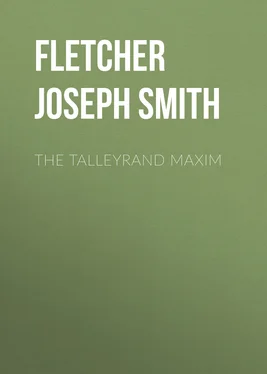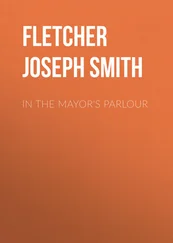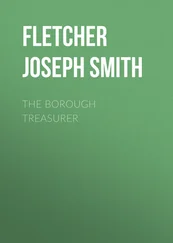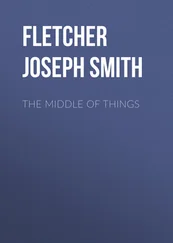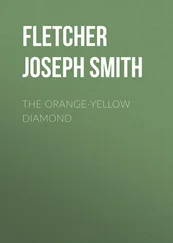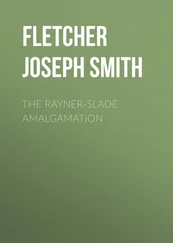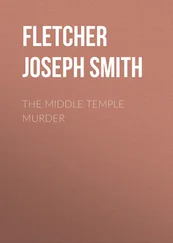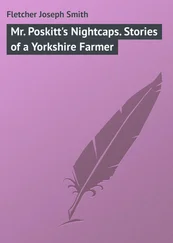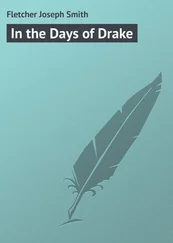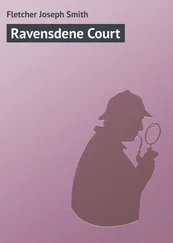Joseph Fletcher - The Talleyrand Maxim
Здесь есть возможность читать онлайн «Joseph Fletcher - The Talleyrand Maxim» — ознакомительный отрывок электронной книги совершенно бесплатно, а после прочтения отрывка купить полную версию. В некоторых случаях можно слушать аудио, скачать через торрент в формате fb2 и присутствует краткое содержание. Жанр: foreign_prose, Классический детектив, foreign_detective, foreign_antique, на английском языке. Описание произведения, (предисловие) а так же отзывы посетителей доступны на портале библиотеки ЛибКат.
- Название:The Talleyrand Maxim
- Автор:
- Жанр:
- Год:неизвестен
- ISBN:нет данных
- Рейтинг книги:3 / 5. Голосов: 1
-
Избранное:Добавить в избранное
- Отзывы:
-
Ваша оценка:
- 60
- 1
- 2
- 3
- 4
- 5
The Talleyrand Maxim: краткое содержание, описание и аннотация
Предлагаем к чтению аннотацию, описание, краткое содержание или предисловие (зависит от того, что написал сам автор книги «The Talleyrand Maxim»). Если вы не нашли необходимую информацию о книге — напишите в комментариях, мы постараемся отыскать её.
The Talleyrand Maxim — читать онлайн ознакомительный отрывок
Ниже представлен текст книги, разбитый по страницам. Система сохранения места последней прочитанной страницы, позволяет с удобством читать онлайн бесплатно книгу «The Talleyrand Maxim», без необходимости каждый раз заново искать на чём Вы остановились. Поставьте закладку, и сможете в любой момент перейти на страницу, на которой закончили чтение.
Интервал:
Закладка:
"Nothing at all particular before half-past four or so, sir."
Collingwood took a closer look at Jabez Naylor. He saw that he was an observant lad, evidently of superior intelligence—a good specimen of the sharp town lad, well trained in a modern elementary school.
"Oh?" he said. "Nothing particular before half-past four, eh? Did he do something particular after half-past four?"
"There was a post came in just about then, sir," answered Jabey. "There was an American letter—that's it, sir—just in front of you. Mr. Bartle read it, and asked me if we'd got a good clear copy of Hopkinson's History of Barford . I reminded him that there was a copy amongst the books that had been bought from Mallathorpe's Mill some time ago."
"Books that had belonged to Mr. John Mallathorpe, who was killed?" asked Collingwood, who was fully acquainted with the chimney accident.
"Yes, sir, Mr. Bartle bought a lot of books that Mr. Mallathorpe had at the Mill—local books. They're there in that corner: they were put there when I fetched them, and he'd never looked over them since, particularly."
"Well—and this History of Barford ? You reminded him of it?"
"I got it out for him, sir. He sat down—where you're sitting—and began to examine it. He said something about it being a nice copy, and he'd get it off that night—that's it, sir: I didn't read it, of course. And then he took some papers out of a pocket that's inside it, and I heard him say 'Bless my soul—who'd have thought it!'"
Collingwood picked up the book which the boy indicated—a thick, substantially bound volume, inside one cover of which was a linen pocket, wherein were some loose maps and plans of Barford.
"These what he took out?" he asked, holding them up.
"Yes, sir, but there was another paper, with writing on it—a biggish sheet of paper—written all over."
"Did you see what the writing was? Did you see any of it?"
"No, sir—only that it was writing, I was dusting those shelves out, over there; when I heard Mr. Bartle say what he did. I just looked round, over my shoulder—that was all."
"Was he reading this paper that you speak of?"
"Yes, sir—he was holding it up to the gas, reading it."
"Do you know what he did with it?"
"Yes, sir—he folded it up and put it in his pocket."
"Did he say any more—make any remark?"
"No, sir. He wrote a letter then."
"At once?"
"Yes, sir—straight off. But he wasn't more than a minute writing it.
Then he sent me to post it at the pillar-box, at the end of the Alley."
"Did you read the address?"
The lad turned to a book which stood with others in a rack over the chimney-piece, and tapped it with his finger.
"Yes, sir—because Mr. Bartle gave orders when I first came here that a register of every letter sent out was to be kept—I've always entered them in this book."
"And this letter you're talking about—to whom was it addressed?"
"Miss Mallathorpe, Normandale Grange, sir."
"You went and posted it at once?"
"That very minute, sir."
"Was it soon afterwards that Mr. Bartle went out?"
"He went out as soon as I came back, sir."
"And you never saw him again?"
Jabey shook his head.
"Not alive, sir," he answered. "I saw him when they brought him back."
"How long had he been out when you heard he was dead?"
"About an hour, sir—just after six it was when they told Mrs. Clough and me. He went out at ten minutes past five."
Collingwood got up. He gave the lad's shoulder a friendly squeeze.
"All right!" he said. "Now you seem a smart, intelligent lad—don't mention a word to any one of what we've been talking about. You have not mentioned it before, I suppose? Not a word? That's right—don't. Come in again tomorrow morning to see if I want you to be here as usual. I'm going to put a manager into this shop."
When the boy had gone Collingwood locked up the shop from the house side, put the key in his pocket, and went into the kitchen.
"Mrs. Clough," he said. "I want to see the clothes which my grandfather was wearing when he was brought home last night. Where are they?"
"They're in that little room aside of his bed-chamber, Mestur Collingwood," replied the housekeeper. "I laid 'em all there, on the clothes-press, just as they were taken off of him, by Lawyer Eldrick's orders—he said they hadn't been examined, and wasn't to be, till you came. Nobody whatever's touched 'em since."
Collingwood went upstairs and into the little room—a sort of box-room opening out of that in which the old man lay. There were the clothes; he went through the pockets of every garment. He found such things as keys, a purse, loose money, a memorandum book, a bookseller's catalogue or two, two or three letters of a business sort—but there was no big folded paper, covered with writing, such as Jabey Naylor had described.
The mention of that paper had excited Collingwood's curiosity. He rapidly summed up what he had learned. His grandfather had found a paper, closely written upon, in a book which had been the property of John Mallathorpe, deceased. The discovery had surprised him, for he had given voice to an exclamation of what was evidently astonishment. He had put the paper in his pocket. Then he had written a letter—to Mrs. Mallathorpe of Normandale Grange. When his shop-boy had posted that letter, he himself had gone out—to his solicitor. What, asked Collingwood, was the reasonable presumption? The old man had gone to Eldrick to show him the paper which he had found.
He lingered in the little room for a few minutes, thinking. No one but Pratt had been with Antony Bartle at the time of his seizure and sudden death. What sort of a fellow was Pratt? Was he honest? Was his word to be trusted? Had he told the precise truth about the old man's death? He was evidently a suave, polite, obliging sort of fellow, this clerk, but it was a curious thing that if Antony Bartle had that paper, whatever it was—in his pocket when he went to Eldrick's office it should not be in his pocket still—if his clothing had really remained untouched. Already suspicion was in Collingwood's mind—vague and indefinable, but there.
He was half inclined to go straight back to Eldrick & Pascoe's and tell Eldrick what Jabey Naylor had just told him. But he reflected that while Naylor went out to post the letter, the old bookseller might have put the paper elsewhere; locked it up in his safe, perhaps. One thing, however, he, Collingwood, could do at once—he could ask Mrs. Mallathorpe if the letter referred to the paper. He was fully acquainted with all the facts of the Mallathorpe history; old Bartle, knowing they would interest his grandson, had sent him the local newspaper accounts of its various episodes. It was only twelve miles to Normandale Grange—a motor-car would carry him there within the hour. He glanced at his watch—just ten o 'clock.
An hour later, Collingwood found himself standing in a fine oak-panelled room, the windows of which looked out on a romantic valley whose thickly wooded sides were still bright with the red and yellow tints of autumn. A door opened—he turned, expecting to see Mrs. Mallathorpe. Instead, he found himself looking at a girl, who glanced inquiringly at him, and from him to the card which he had sent in on his arrival.
CHAPTER IV
THE FORTUNATE POSSESSORS
Collingwood at once realized that he was in the presence of one of the two fortunate young people who had succeeded so suddenly—and, according to popular opinion, so unexpectedly—to John Mallathorpe's wealth. This was evidently Miss Nesta Mallathorpe, of whom he had heard, but whom he had never seen. She, however, was looking at him as if she knew him, and she smiled a little as she acknowledged his bow.
Читать дальшеИнтервал:
Закладка:
Похожие книги на «The Talleyrand Maxim»
Представляем Вашему вниманию похожие книги на «The Talleyrand Maxim» списком для выбора. Мы отобрали схожую по названию и смыслу литературу в надежде предоставить читателям больше вариантов отыскать новые, интересные, ещё непрочитанные произведения.
Обсуждение, отзывы о книге «The Talleyrand Maxim» и просто собственные мнения читателей. Оставьте ваши комментарии, напишите, что Вы думаете о произведении, его смысле или главных героях. Укажите что конкретно понравилось, а что нет, и почему Вы так считаете.
